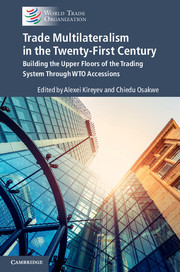 Trade Multilateralism in the Twenty-First Century
Trade Multilateralism in the Twenty-First Century from PART II - Negotiators’ Perspectives on the WTO Accession Process
Published online by Cambridge University Press: 28 November 2017
Abstract
This chapter considers political, commercial and legal aspects of accession negotiations and the compromises by all parties involved to make accession to the World Trade Organization (WTO) a reality. Using the negotiations on the accessions of the Russian Federation and Samoa as case studies, this chapter analyses how political constraints, economic interests and legal commitments affected the course of the negotiations. In the case of the Russian Federation, the focus was on certain investment programmes in the automotive industry that were deemed inconsistent with the Agreement on Trade-Related Investment Measures (TRIMs). Agreement on these measures required prolonged negotiations, including at ministerial levels, to find a satisfactory solution for all parties involved. In the case of Samoa, attention was focused on the appropriate level of flexibility to be granted to a least-developed country (LDC), as the expansion of LDC membership is a priority for the Organization, in accordance with the Guidelines on LDCs’ accessions. The chapter concludes that the experience of accession negotiations has helped to define domestic reform in acceding members, clarify the application of WTO provisions in practice, upgrade regional integration frameworks and counter negative political pressures. These lessons can be used in negotiations by other acceding economies and constitute important building blocks of the upper floors of the international trading system.
I was posted as Minister and Deputy Chief of Mission for WTO Affairs at the Japanese Mission in Geneva from 2010 to 2012. During that period, several accession negotiations were ongoing, and two of them, the Russian Federation and Samoa, were approved at the Eighth Ministerial Meeting held in Geneva in December 2011. I was involved in the Russian Federation's accession process as the de facto chief negotiator for Japan, and in the Samoan accession process as chairperson of the working party. In both cases, I was involved primarily in the end-game stage rather than in the bilateral negotiations, so the focus of this chapter will be on the multilateral aspect of these accession negotiations.
To save this book to your Kindle, first ensure [email protected] is added to your Approved Personal Document E-mail List under your Personal Document Settings on the Manage Your Content and Devices page of your Amazon account. Then enter the ‘name’ part of your Kindle email address below. Find out more about saving to your Kindle.
Note you can select to save to either the @free.kindle.com or @kindle.com variations. ‘@free.kindle.com’ emails are free but can only be saved to your device when it is connected to wi-fi. ‘@kindle.com’ emails can be delivered even when you are not connected to wi-fi, but note that service fees apply.
Find out more about the Kindle Personal Document Service.
To save content items to your account, please confirm that you agree to abide by our usage policies. If this is the first time you use this feature, you will be asked to authorise Cambridge Core to connect with your account. Find out more about saving content to Dropbox.
To save content items to your account, please confirm that you agree to abide by our usage policies. If this is the first time you use this feature, you will be asked to authorise Cambridge Core to connect with your account. Find out more about saving content to Google Drive.